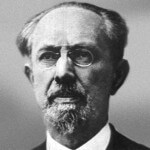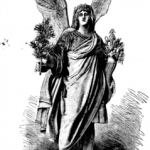| Those of us in the democratic-republican West often find it impossible to understand how the world could go to war so often in the 20th century. We were raised in a culture that had internalized Locke, Jefferson, Mill, and others — for whom the goal of peace and respect for others’ rights to life, liberty, and property were fundamental. We (still) have little-to-no grasp of an alien modern ideology that makes conflict and waging war fundamental to its cultural health.
For the German National Socialists and the Italian Fascists, for example, war was natural, normal, and essential to a nation’s progress. How did they come to believe that?
Part of the story is intellectual: National Socialists and Fascists admired Nietzsche’s positive philosophy, for example — this earlier post collects several quotations from Nietzsche on the necessity and desirability of war.
And between Nietzsche (who was no longer functioning intellectually after 1889) and the Nazis (who assumed power in 1933) were many prominent German intellectuals — historians, sociologists, political theorists, jurists — including Werner Sombart, Moeller van den Bruck, Ernst Junger, Oswald Spengler, Carl Schmitt — whose advocacy of the authoritarian state shaped a generation’s thinking.
 |
Werner Sombart’s 1915 Händler und Helden (Merchants and Heroes) is representative. Sombart was early an admirer of Karl Marx, though he drifted to the right after repeatedly being disappointed when the communist revolution failed to materialize. Merchants and Heroes contrasts two types — the merchant (represented in his era by the English) and the hero (represented by the Germans). Merchants are of a lower order: they are calculating, interested in profit, money, and the physical comforts of life. Heroes, by contrast, are of higher historical significance, motivated by the ideal of the great deed and sacrifice for a noble calling. Early in Händler und Helden Sombart explains his purpose:
“At issue in this war are the merchant and the hero, the mercantile and heroic Weltanschauung, and the culture that pertains to each. The reason why I am trying, by means of these terms, to isolate a profound and comprehensive antagonism between world-views and experiences of the world is the subject of the following analysis.”
Here is Rohan d’O. Butler’s 1942 summary of Sombart’s views:
“Before 1914 all the true German ideals of heroic life were in deadly danger before the continuous advance of English commercial ideals, English comfort, and English sport. The English people had not only themselves become completely corrupted, every trade-unionist being sunk in the ‘morass of comfort,’ but they had begun to infect all other peoples. Only the war had helped the Germans to remember that they were really a people of warriors, a people among whom all activities and particularly all economic activities were subordinated to military ends.
“Sombart knew that the Germans were held in contempt by other people because they regard war as sacred — but he glories in it. To regard war as inhuman and senseless is a product of commercial views. There is a life higher than the individual life, the life of the people and the life of the state, and it is the purpose of the individual to sacrifice himself for the higher life. War is to Sombart the consummation of the heroic view of life, and the war against England is the war against the opposite ideal, the commercial ideal of individual freedom and of English comfort, which in his eyes finds its most contemptible expression in—the safety razors found in the English trenches.”
Sombart has in mind Englishmen such as Richard Cobden and John Stuart Mill. Here is Cobden in 1835: “The middle and industrious classes of England can have no interest apart from the preservation of peace. The honours, the fame, the emoluments of war belong not to them; the battle-plain is the harvest-field of the aristocracy, watered with the blood of the people.”
And here is Mill: “It is commerce which is rapidly rendering war obsolete, by strengthening and multiplying the personal interests which are in natural opposition to it.” Mill again:
“Finally, commerce first taught nations to see with good will the wealth and prosperity of one another. Before, the patriot, unless sufficiently advanced in culture to feel the world his country, wished all countries weak, poor, and ill-governed, but his own: he now sees in their wealth and progress a direct source of wealth and progress to his own country. It is commerce which is rapidly rendering war obsolete, by strengthening and multiplying the personal interests which are in natural opposition to it.
“And it may be said without exaggeration that the great extent and rapid increase of international trade, in being the principal guarantee of the peace of the world, is the great permanent security for the uninterrupted progress of the ideas, the institutions, and the character of the human race” (Principles of Political Economy, Book III, Chapter XVII, Section 14).
Despicable, Sombart believed. The German way of war will cleanse humanity and raise it to a sacred height.
Source:
Rohan d’O. Butler, The Roots of National Socialism, E. P. Dutton & Co., Inc. (1942), pp. 170-171.
Related:
Sombart is part of the story told in “The Crisis of Socialism” [pdf] which is Chapter 5 of Explaining Postmodernism: Skepticism and Socialism from Rousseau to Foucault.
Quotations on German Militarism, which is Appendix 4 to Nietzsche and the Nazis.
See also this 2005 article by Stephen Davies, “Warriors and Merchants.” |



